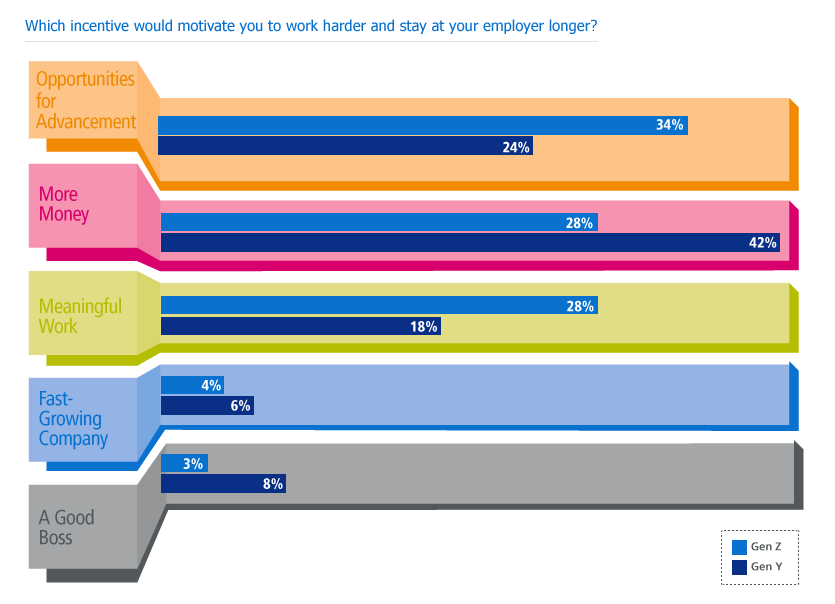
Gen Z: Who Are They and What Are They Like?
As People
Generation Z includes the nearly 73 million people born between 1995 and 2010. The first of this generation entered the workforce last year.1 So, who are these people and what are they like?
Here’s what we know:
- Optimistic and realistic. Coming off the tail-end of the Millennial generation but living through a recession, most members of Gen Z experienced both prosperity and hardship. These influences left their mark on the generation in a unique combination of optimism and realism. While members of Gen Z are more realistic then their Millennial counterparts, they still value self-development and seek a higher sense of purpose.
- Independent. Gen Z is independent. More than 70% of this generation believe the saying “if you want it done right you have to do it yourself,” and 69% prefer their own workspace.2
- Digital experts. Gen Z are expert users of all things digital, in part because 87% of adults had access to the internet by 2014, according to a Pew Research report.2 Gen Z doesn’t know anything different; their life has consisted of social media, internet, Wi-Fi, video conferencing, and 24/7 access to information since they were born.
- Social. Interestingly, the prevalence of technology and the independent mindset that characterize this generation have not had the effect on sociability that one might expect. Most of this generation—74% to be exact—prefer to engage face-to-face with colleagues.2
As Employees
- Pragmatic and strategic. Members of Gen Z are more likely to remain with a company for a longer period compared to their Millennial counterparts, primarily to benefit from their investment.
- Growth-oriented. Gen Z’ers will expect their employers to advance them into new roles with speed and efficiency.
- Competitive. Gen Z has a competitive streak, and many in this generation prefer to work independently. However, they’ll still expect and crave feedback.
- Private. Members of Gen Z are not as willing to share personal information with either their bosses or employers, in part because they have a better understanding of what’s at stake in a digital age where cyberattacks are a reality.
So, given what we know about Gen Z, how can you, as an employer, work effectively with this generation?
Here are our four top tips to catapult recruitment and maximize retention.
Gen Z: Recruitment & Retention
Recruitment
- Start much earlier. Gen Z has a more pragmatic approach to education, work, and money. 60% of this generation are in favor of gaining an education in their field from employers.3 They don’t necessarily believe a college education is best. In fact, 47% of Gen Z’ers would enter the workforce right out of high school.3
Employers will need to start their outreach much earlier because Gen Z’ers won’t necessarily come through the traditional pipeline. Start your outreach when members of Gen Z are 17 or 18 years old and continue to recruit them throughout their college years because they’re researching you much earlier.
- Build your brand and expand your reach so Gen Z can find you. Gen Z is expected to spend a significant amount of time researching companies they’d consider working for, so make sure they can find out about you.
Build your brand by posting lots of content across different channels, but be helpful, informational, and authentic. Ask employees to talk about what it’s like to work at your company online and share employee profiles on your site and career forums. Basically, paint a picture for Gen Z about what it’s like to work at your company and support it with personal anecdotes.
In addition, make sure the content you share is short, to the point, and visually impactful, and when you go to recruit individual members of this generation, reach out using live streaming methods. Gen Z likes face-to-face interactions.
Retention
- Offer better benefits. Gen Z will remain with the companies they work for longer. They appreciate value and seek to reap the benefits of their investments. This is a shift for many employers who are used to making healthcare decisions with job-hopping employees in mind.
Employers will want to offer attractive voluntary benefits in addition to all the traditional benefits that workers expect. Financial voluntary benefits will go a long way toward retaining members of this generation for even longer periods of time. Try offering a more generous employer matches. For example, dollar-for-dollar 401k matching programs are on the rise. You could offer such a program or improve upon it by contributing more than a dollar for every dollar employers contribute.

- Execute professional development programs. Although most employers have great intentions when it comes to helping employees advance within the company, professional development programs tend to fall through the cracks.
If you want tap into Gen Z’ers desire to remain with their employer for longer periods of time, take their goals seriously, and help them advance their career within your company.
Members of this generation like the idea of trying different roles, so if upward mobility isn’t possible, consider letting them try a new position but still increase their pay—even if they aren’t moving up the ladder, a lateral move will broaden their skill set and that’s worth the financial reward, especially if it maximizes retention.
Everything’s Easier with a Reliable Partner’s Help
You attracted Gen Z to your company, now retain them by offering great benefits and acting on their needs. Clarity Benefit Solutions has provided expert assistance to employers looking to expand and manage their benefits for years. Learn more from their FSA administrators about FSA administration solutions or explore their revolutionary product line and technological solutions today.
Sources:
1. https://www.benefitspro.com/2016/11/03/welcome-generation-z
2. https://www.inc.com/ryan-jenkins/generation-z-vs-millennials-the-8-differences-you-.html
3. https://www.shrm.org/ResourcesAndTools/hr-topics/talent-acquisition/Pages/4-Tips-for-Recruiting-Generation-Z.aspx